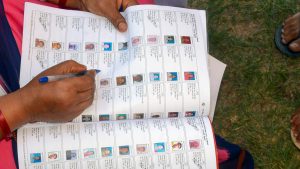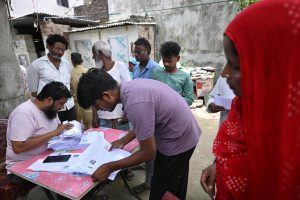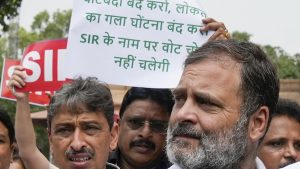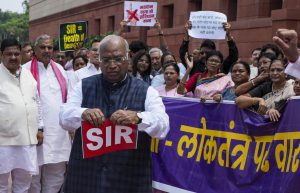Bihar – The Bihar SIR process has revealed that almost 66 lakh voters are unlikely to make it to the draft electoral roll scheduled for publication on August 1, 2025. This significant exclusion represents a substantial portion of Bihar’s electorate, which had over 7.89 crore voters according to the 2025 electoral rolls, raising serious questions about the comprehensive nature of the Special Intensive Revision exercise.
According to Election Commission of India data released on Friday, July 25, 2025—the final day for submission of enumeration forms in the ongoing Bihar SIR process—the forms of 7.23 crore electors have been received and digitised. All these verified electors will have their names included in the draft electoral roll, while the remaining population faces potential exclusion from the democratic process.
Technical Implementation and Timeline

The Bihar SIR exercise has demonstrated the Election Commission’s commitment to digital modernization of electoral processes. The poll body confirmed that digitisation of forms from the remaining electors will be completed by August 1, alongside comprehensive Booth Level Officer (BLO) reports that provide ground-level verification of voter information.
The Bihar SIR process, which began on June 24, represents a month-long intensive effort to update and verify Bihar’s electoral database. The exercise involves systematic verification of existing voter registrations while identifying deceased voters, duplicate registrations, and individuals who have migrated from their registered constituencies.
Comprehensive Voter Verification Results


During the Bihar SIR implementation, local Booth Level Officers have identified significant irregularities in the existing electoral database. Their reports reveal approximately 22 lakh deceased electors whose names remained on the rolls, highlighting the need for regular database maintenance and verification processes.
The Bihar SIR exercise has also uncovered 7 lakh voters registered in multiple locations, indicating systematic issues with voter registration processes that allowed duplicate entries. Additionally, 35 lakh individuals have been identified as having either permanently migrated from their registered constituencies or could not be traced during the verification process.
Furthermore, the Bihar SIR process shows that enumeration forms of approximately 1.2 lakh electors are yet to be received, contributing to the overall shortfall in verified voter registrations for the upcoming draft electoral roll.
Also Read: Ajit Pawar On Mumbai Train Blasts Ruling: Shocking Statement Sparks Controversy
Objection and Rectification Process
The Bihar SIR framework includes provisions for addressing potential errors and omissions in the draft electoral roll. From August 1 to September 1, 2025, any elector or political party may submit prescribed forms to Electoral Registration Officers (EROs) claiming inclusion of eligible electors who have been excluded from the draft roll.
Similarly, the Bihar SIR process allows for filing objections requesting removal of ineligible electors who may have been incorrectly included. This month-long window provides stakeholders with adequate opportunity to ensure the accuracy and completeness of the final electoral roll before its implementation in future elections.
Political Party Engagement


The Bihar SIR exercise has involved extensive consultation with major political parties to ensure transparency and accountability. On July 20, comprehensive lists of electors who failed to submit forms, deceased individuals, and those who have permanently migrated were shared with all 12 major political parties operating in Bihar.
These parties include the Bahujan Samaj Party, Bharatiya Janata Party, Communist Party of India (Marxist), Indian National Congress, Rashtriya Janata Dal, Janata Dal (United), Rashtriya Lok Samta Party, Communist Party of India (Marxist–Leninist) (Liberation), Rashtriya Lok Janshakti Party, Lok Janshakti Party (Ram Vilas), National People’s Party, and Aam Aadmi Party, ensuring broad political representation in the Bihar SIR oversight process.
Massive Administrative Deployment
The Bihar SIR implementation required unprecedented administrative coordination involving multiple levels of electoral machinery. A total of 38 Deputy Electoral Officers provided district-level supervision, while 243 Electoral Registration Officers ensured proper implementation across constituencies.
The Bihar SIR exercise deployed 2,976 Assistant Electoral Registration Officers for detailed administrative support, complemented by Booth Level Officers stationed at 77,895 polling booths throughout Bihar. This extensive network ensured comprehensive coverage during the verification process, supported by dedicated volunteers who facilitated public participation.
Political parties contributed significantly to the Bihar SIR process by nominating 38 district presidents and 1.60 lakh booth-level agents who provided ground-level monitoring and assistance during the enumeration period.
Political Opposition and Legal Challenges
The Bihar SIR has faced significant political opposition, with several parties challenging the exercise’s legitimacy and methodology. Opposition parties have characterized the process as an attempt to implement the National Register of Citizens (NRC) through indirect means, raising concerns about potential voter disenfranchisement.


Leader of Opposition in Rajya Sabha and Congress MP Mallikarjun Kharge demonstrated against the Bihar SIR by tearing a placard marked “SIR” and disposing of it during Parliament’s Monsoon session, symbolizing opposition resistance to the exercise.
Legal Proceedings and Future Implications
The Bihar SIR faces judicial scrutiny as the contentious exercise has been challenged in the Supreme Court. A crucial hearing is scheduled for July 28, 2025, which may determine the future implementation of similar electoral revision processes across the country.
The Bihar SIR was initially ordered on June 24 with plans for nationwide implementation beginning with Bihar as a pilot state. However, legal challenges and political opposition may influence the exercise’s continuation and expansion to other states.
The outcome of the Supreme Court hearing will significantly impact the Bihar SIR process and establish important precedents for electoral roll revision procedures throughout India, potentially affecting millions of voters’ democratic participation rights.

